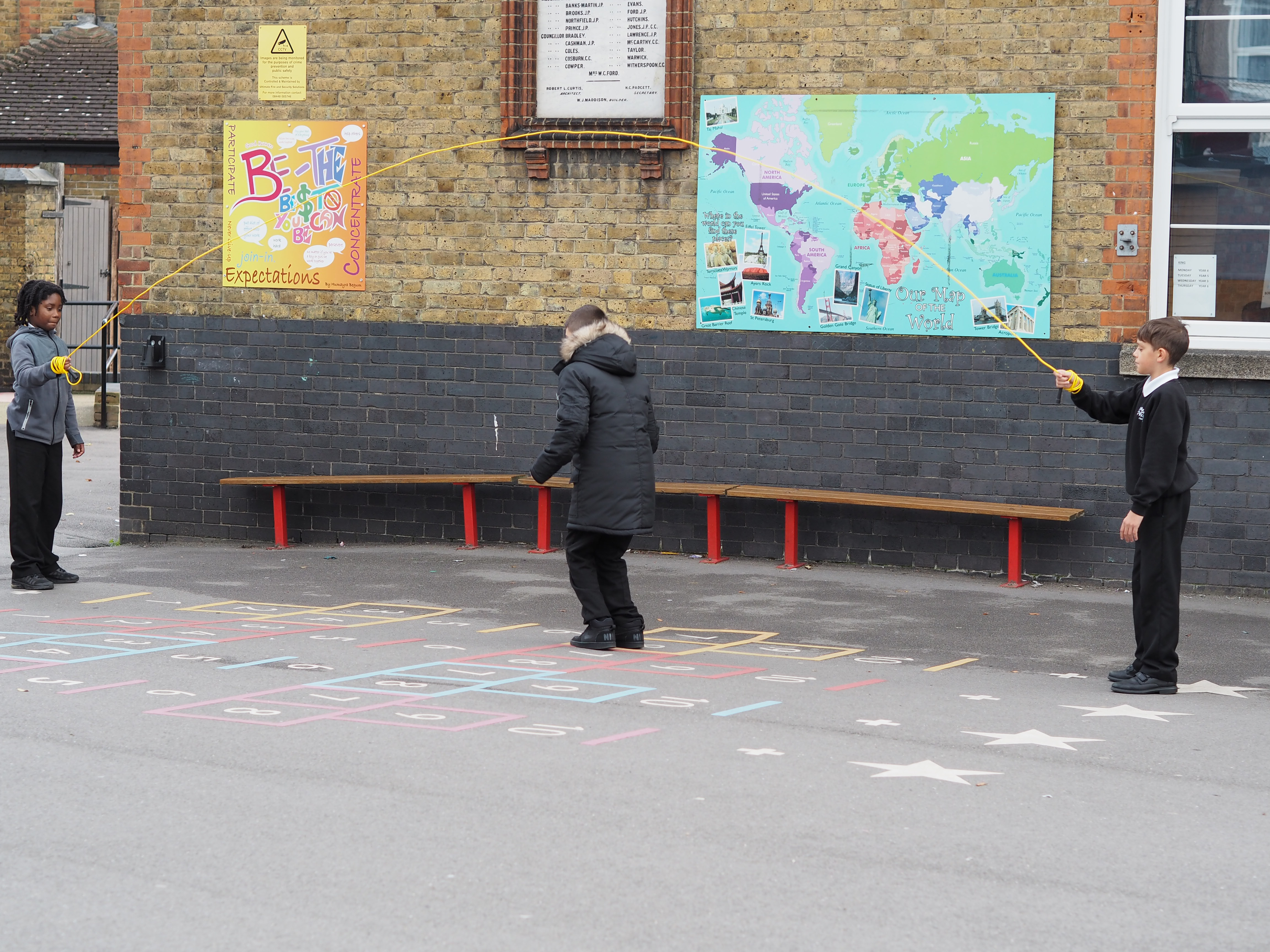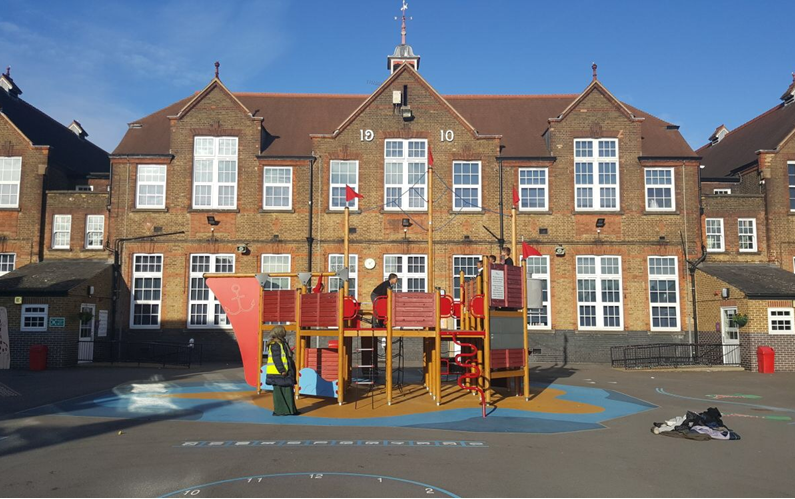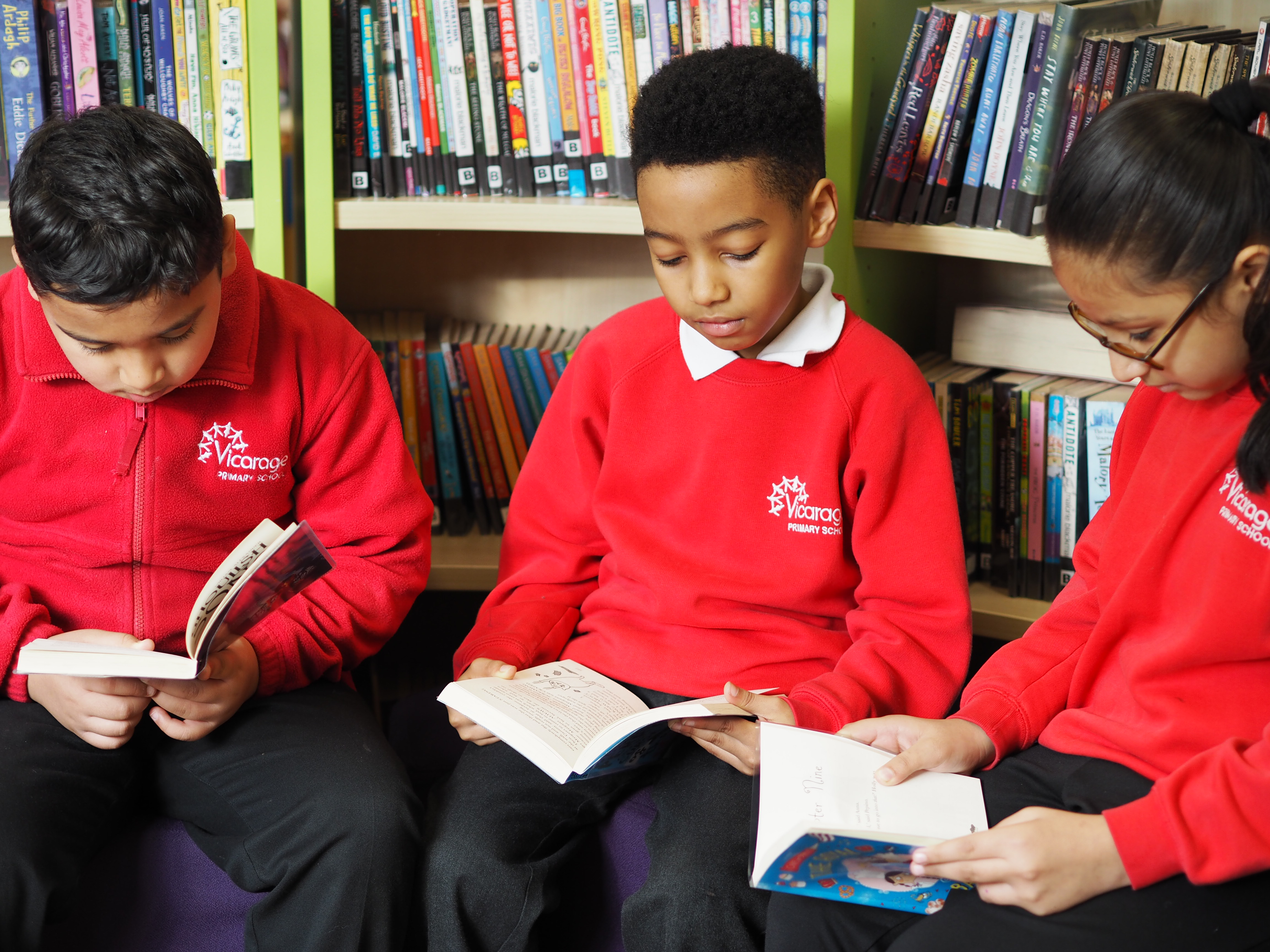At Vicarage, we aim to inculcate into children that the ability to read goes far beyond the mechanics of simply reading a book. Reading is interlinked with thinking; the wider you read, the greater you can understand and the deeper you can think. Reading allows the opening of doors in all subject areas; being able to make meaningful links between different areas of learning is a successful by-product of a good reader. Strong and consistent role-modelling within school and a sustainable culture and ethos of reading for pleasure and learning is what underpins our success and our pupils’ success within school and beyond.
The success in reading is based on five threshold concepts:
- Reading widely and often
- Developing fluency
- Construct meaning
- Reading discussions
- Wider world
Each of these concepts are developed upon as children progress through the school. It allows them to develop a strong and deeper understanding in reading and comprehension, allows for critical thinking and a better understanding of the world.
Reading for Pleasure
Reading for pleasure at Vicarage Primary School aims to establish each child as a lifetime reader based on developing a love of reading. We ensure our children are given a rich curriculum which encourages reading of books and other kinds of texts.
At Vicarage we aim to promote the concepts of reading for ‘fun’, ‘enjoyment’ and ‘pleasure’.
What Vicarage does to promote reading for pleasure:
- We have age-related fiction and non-fiction within each class via the class book corner.
- Through guided reading, we explore rich vocabulary and complete shared class reading to engage and give opportunities to discuss books as a class.
- Daily storytime sessions are held throughout the school
- Children have access to the school library during school time and after school.
- Reading takes place both in and outside of the classroom and in and outside of the school. We have reading trolleys out every lunchtime!
- The school encourages links with parents by ensuring every child has a Reading Journal’ that records all reading habits, signed by parents and monitored by class teachers.
- We also ensure that teachers make regular recommendations to pupils to encourage reading for pleasure.
- Authors come and run workshops to excite and engage our children on new books
- In addition, we celebrate reading through themed days e.g. World Book Day and Reading Festivals! to encourage and develop the passion for reading
Literacy Programme of Study
Early reading and early language development:
Systematic synthetic phonics: Read Write Inc (RWI)
At Vicarage we follow the RWI phonics programme. RWI is a complete phonics programme with high quality training, assessment, intervention and resources (including decodable books). We train all new members of staff in the RWI approach and provide ongoing training and support for existing teachers through practice sessions and coaching. We carry out intervention to support pupils to ‘keep up’ with the programme. Children’s early independent reading is exclusively reading the RWI fully decodable books, ensuring that children are only asked to read books with sounds that they know.
Reading and Writing – separate subjects:
Once children can read accurately and fluently, we teach reading and writing as separate subjects. Teaching writing separately allows teachers and children to focus on the writing processes and writing skills and allows pupils the freedom to use their own ideas without being constrained by the text they are reading. It prevents writing outcomes from being solely a response to reading and instead allows pupils the freedom to develop and use their own ideas without being overly constrained by the text they are reading.
Reading:
From November 2021, we are using the Take One Book reading programme created by Just Imagine. We have adopted this scheme as it is based on real children’s literature and teaches comprehension (and grammar) explicitly in relation to these high quality texts.
The Take One Book units all have the following structure:
- Hook – to engage the children ahead of introducing the text
- Orientation – to activate prior knowledge, build background knowledge and introduce key vocabulary
- First encounters – includes reading the text, exploring ideas, checking understanding and exposing thinking
- Digging deeper – refining a response and expanding thinking
- Review and reflect – including discussing the relevance of the book to the wider world
- Wider learning opportunities (this may run throughout the unit or at the end)
More information can be found about Take One Book here: https://www.takeonebook.org/
Writing:
From October 2021, we are following the Writing for Pleasure (WfP) pedagogical principles of Young and Ferguson. These include:
- Explicitly teaching the writing processes (how to generate an idea, plan, draft, revise, edit, publish)
- Teachers teach a mini lesson daily and children are invited to apply the principles of this mini lesson to their writing
- Children are given time to write every day
- Writing projects have a purpose and audience
- Children are given time to read, share, think and talk about writing
- Children have the opportunity to pursue personal writing projects
- Teachers carry out ‘pupil conferencing’ to support pupils to further develop their writing
More information can be found about the Writing for Pleasure pedagogy here: https://writing4pleasure.com/
our pupils also create a portfolio of extended independent writing. Each child has a “Progress in writing book” which contains a range of final, redrafted pieces of writing. This portfolio moves with them throughout school as they transition between each year group, and it ensures that skills are built upon year on year.
Debating and Oracy:
- There is a constant thread through the taught curriculum for opportunities for pupils to develop ’oracy,’ through debating, talk partners, paired and collaborative work, drama, role-play activities, circle time, listening to and discussing stories as well as presentations of learning.
- There are also opportunities for children to develop their ‘oracy’ skills outside of the taught curriculum. These activities include: assemblies, school council and Eco-council meetings and school productions.
- Our Year 5 and 6 pupils take part in Debate Mate competitions held across the borough
- Music lessons and singing assemblies supports pupils’ in pronunciation, projection of their voices, use of expression and improving confidence. Our school choir takes part in the annual Young Voices event at the O2 alongside hundreds of other primary and secondary pupils across London.
Grammar:
Grammar is taught through the Take One Book reading scheme and through writing ‘mini lessons’. Required ‘mini lessons’ will be mapped out for each year group to ensure curriculum coverage. Where necessary, additional discrete grammar lessons may be taught to ensure full coverage of the grammar curriculum. Year groups are taught new content according to the Grammar Progression document, but regular revisiting of previous years’ content is built into our grammar teaching. This ensures that pupils know and remember more of what they are taught.
Handwriting:
The Letterjoin handwriting scheme should be taught through explicit teaching from Summer Term in Year 1. Teachers are expected to model this cursive style on the board and in pupil books.
Reading Progression Overview
Writing Progression Overview
Spoken Language Progression Overview
Gallery






